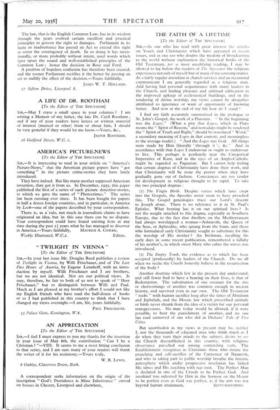THE FAITH OF A LIFETIME-
[To the Editor of THE SPECTATOR] SIR,—As one who has read with great interest the articles on Youth and Christianity which have appeared in recent issues, and as one too who doubts the wisdom of broadcasting to the world without explanation the historical books of the Old Testament, per se most unedifying reading, I may be allowed to lay before the readers of The Spectator the religious experiences not only of myself but of many of my contemporaries. As a fairly regular attendant at church services and an occasional communicant I am generally regarded as a religious man. Arid having had personal acquaintance with many leaders in the Church, and finding pleasure and spiritual edification in the improved upkeep of ecclesiastical buildings, and in the rendering of divine worship, my views cannot be altogether attributed to ignorance or want of opportunity of knowing better. And now at the end of my life how do I stand ?
I find my faith accurately summarised in the prologue to St. John's Gospel, the work of a Platonist. " In the beginning was the Logos." (What a pity that Logos, which in Plato means the " Spirit of Reason," and nowadays might be rendered the " Spirit of Truth and Right," should be translated " Word," a secondary meaning of Logos in that context, and meaningless to the average reader.) " And the Logos was God. All things were made by Him (literally ' through it '), &c." And in accordance with that Logos I endeavour or ought to endeavour to live. This perhaps is perilously near the Categorical Imperative of Kant, and in the eyes of an Anglo-Catholic might be regarded as Paganism. But I cannot help feeling that certain dogmas of Christianity have done their work, and that Christianity will be none the poorer when they have gradually gone out of fashion. Consciences are too tender for development in religious thought to be rapid. To take the two principal dogmas : (I) The Virgin Birth. Despite verses which have crept into the Gospels, the Apostles never seem to have preached this. The Gospel genealogies trace our Lord's descent to Joseph alone. There is no reference to it in St. Paul's Epistles. What bearing has it on our spiritual lives ? Is not the weight attached to this dogma, especially in Southern Europe, due to the fact that dwellers on the Mediterranean had always worshipped a woman—Ashtaroth, the Queen of the Seas, or Aphrodite, who sprang from the foam, and those who formulated early Christianity sought to substitute for this the worship of His mother ? An Irishman, recalling his early days in some recent publication, remembered a lullaby of his mother's, in which sweet Mary who calms the waves was introduced.
(2) The Empty Tomb, the evidence as to which has been accepted (professedly) by leaders of the Church. Do we all when we recite the Creeds honestly believe in the resurrection of the body ?
Another doctrine which few in the present day understand, and still fewer find to have a bearing on their lives, is that of Redemption. The substitution of one creature for the sins or shortcomings of another was common enough in ancient history, and survived even in our own. The Old Testament " reeks " with human sacrifice long after the times of Abraham and Jephthah, and the Mosaic law which prescribed animals or birds never shrank from the idea of a victim for our personal transgressions. No man today would be allowed, if it were possible, to bear the punishment of another, and no one has read unmoved of one who did in Dickens' Tale of Two Cities.
But unorthodox as my views at present may be, neither I, nor the thousands of educated men who think much as I do when they turn their minds to the subject, desire to see the Church disestablished in this country, with religious observance parcelled out among contending sects. The Establishment recognises as Christians those who revere the preaching and self-sacrifice of the Carpenter of Nazareth, and who in taking part in public worship breathe the historic atmosphere which under progressive revelation has linked His times and His teaching with our own. The Perfect Man is declared in one of the Creeds to be Perfect God. And mankind was exhorted by Him in the Sermon on the Mount to be perfect even as God was perfect, as if the aim was not


















































 Previous page
Previous page